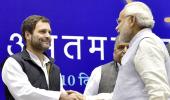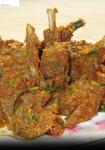Gleaning lessons from Amit Shah’s compendium of Chanakya-isms, the Samajwadi Party is keeping its operations low-key and working on an inclusive strategy, reports Radhika Ramaseshan.

After successive victories chalked up by the Opposition in the recent by-elections in Uttar Pradesh, the Samajwadi Party, which won three of the four by-polls, has been unusually quiet, except for issuing an occasional statement against the Bharatiya Janata Party or staging a protest cyclothon.
There is yet no word on when the SP will cement its alliance with the Bahujan Samaj Party, although the partnership with Ajit Singh’s Rashtriya Lok Dal got off the ground after success in the Kairana and the Noorpur by-polls in May.
The apparent dormancy has led the BJP to presume that the “grand alliance” of the SP, BSP and RLD may not fructify before the Lok Sabha election. Meanwhile, the BJP’s mighty election machinery is visibly whirring at top speed.
There’s a grain of truth in the BJP’s surmise. Like any opposition party that bestirs into activity months before an election, the SP had premised its approach to the next Lok Sabha election on a “victory-by-default-and-not-design” proposition. Belatedly, it realised that this will not work against a fired-up BJP.
With a difference, though. As part of a new rule and reworked strategy, the SP will keep its operations low-key and ring up the curtain when it chooses to. It has proved to be a quick learner, gleaning lessons from Shah’s compendium of Chanakya-isms.
“The BJP changed the character of electioneering in 2014. It injected a high degree of pragmatism. The leaders snagged heavyweights from other parties after promising them the moon, and sewed up strong social alliances with small parties. We will do the same. We have an alliance with the Nishad Party and Mahan Dal (both represent the non-Yadav backward castes). Closer to 2019, we can look at the Suheldev Bharatiya Samaj Party,” said Udayveer Singh, a close aide of Akhilesh Yadav, the SP president. The Suheldev Party is currently a BJP ally but its president Om Prakash Rajbhar is manifestly restive.
Shah literally brought the SP back to the ground. Booth management -- that entails assembling mundane minutiae at the lowest level of electioneering -- was something that never occurred to Mulayam Singh Yadav or Akhilesh before Shah established that it often yielded a positive verdict.
Rajesh Yadav, another Akhilesh confidant and a legislative council member, explained how the SP’s organisation was revamped to respond to the BJP’s dare.
He said, “Regardless of the number of seats we eventually contest, we are constituting booth committees in all the Lok Sabha constituencies (80). Each unit will have 10 members representing the dominant castes of an area. We have stored the Aadhaar and voter card numbers of voters on the mobile phones used by the booth and district ‘prabharis’ (minders) so that the information is on hand.”
If reconstructing the organisation was a facet of Akhilesh’s 2019 template, the more fundamental changes concerned the SP’s perspectives on Hindu-Muslim equations, diluting the allegation of being “excessively pro-minority”, recasting its representation to embrace the non-Yadav backward castes that were put off by the preponderance of Yadavs in its rank-and-file, and looking Dalit-friendly.
“The Lok Sabha election will not be fought on Hindu-Muslim lines. Our leaders are Krishna’s descendants and don’t need the BJP to certify that they are true Hindus. Our discourse will stress the problems faced by farmers, youths, traders, women and Dalits under the BJP. If the BJP raises the issue of illegal immigration, we will say where are the 20 million jobs Modi promised,” a top office-bearer said.
The Muslims appeared unperturbed by the changed tack. Lucknow’s influential Sunni cleric and Muslim Personal Law Board member Maulana Khalid Rasheed Firangi Mahli said: “We want the non-BJP opposition to only speak about development, security, education and health, which concern everybody -- a Hindu, a Muslim or a Christian. Anything in the name of religion leads to polarisation.”
Zafaryab Jilani, an SP sympathiser and convener of the Babri Masjid Action Committee, said the tweaked approach didn’t mean Akhilesh took Muslim voters “for granted”. “Akhilesh is concerned about the growing indifference among the Muslims towards voting. He met community leaders and opinion-shapers, and asked them to re-activate Muslim voters,” said Jilani.
As Jilani clarified that the SP should nominate Muslims only in constituencies that had a minority population in excess of 30 per cent, the non-Yadav backward caste leaders were emphatic that their representation should be in direct proportion to their population.
The other aspects of the SP’s game plan were keeping the Congress out of the alliance because of its reported inability to transfer its upper caste votes and positioning Prime Minister Narendra Modi as the centrepiece of its campaign.
Sunil Singh Yadav, regarded as Akhilesh’s “eyes and ears”, said, “The BJP flaunts Modi as its only asset. Where have his promises of jobs and peace on the border disappeared? When we ask people, have your appointment letters come, they laugh aloud. Judging from the popular response, our anti-Modi campaign can’t boomerang.”
>> Bridging the vote deficit
The BJP and its ally Apna Dal got 73 out of 80 Lok Sabha seats in 2014 and secured 42.65 per cent vote share; the SP got five seats and a vote share of 22.35 per cent; the BSP got no seats but polled 19.77 per cent votes. The RLD had no seat and was polled 0.86% votes
>> Seat-sharing
The SP willing to give more seats to the BSP for the Lok Sabha polls in lieu of a greater share in the next UP assembly election; The BSP wants the SP to give seats to smaller allies from its share
>> Vote transfer
Can the SP transfer its core Yadav votes to the BSP? The Yadavs and the Dalits politically do not go along
>> Joint campaign
Joint campaign may be kept to a minimum to thwart the possibility of the BJP showing up the alliance as “opportunistic” and “unprincipled”
>> Alliances in other states
The SP and the BSP have pockets of support in Madhya Pradesh, Rajasthan and Maharashtra












